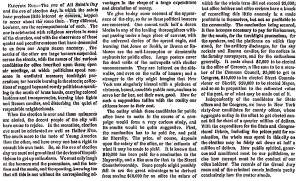Record Data
Transcription
ELECTION EVE
The eve of All Saint's Day and the eve of election day, in which the saints have precious little interest or concern, happen to occur about the same time. Very different, however, are the accompaniments of each. The one is celebrated with religious services in some of the churches, and with the observance of those quaint and peculiar customs that have descended to us from our Anglo Saxon ancestry. The marks of the other are larger banners suspended across the streets, with the names of the various candidates for office inscribed upon them; open air meetings, at which politicians spout nonsense in unstinted measure; torchlight processions; tar barrels burning in the streets; collections of ragged boys and rowdy politicians marching to the music of brass bands, carrying colored lanterns and transparencies, burning blue lights and Roman candles, and disturbing the quiet of respectable neighborhoods.
When the election is over and those nuisances are abated, the decent people of the city will have cause to rejoice. In the meantime, election eve must be celebrated as well as Hallow E'en. The once is more to the taste of Young America than the other, and here every one has a right to consult his own taste. So, on the eve of election day we must not grumble at the devices of the politicians to get up enthusiasm. We must only laugh at the banners and the processions, and the bonfires and the music, and the spouting, knowing too that all this is not without its corresponding advantages in the shape of a large expenditure and circulation of money.
We give to-day some account of the appearance of the city, so far as these political banners are concerned. One cannot walk half a dozen blocks in any of the leading thoroughfares without passing under a huge piece of canvass, with the universal device of the spread eagle, and learning that Jones or Smith, or Brown or Robinson are the anti-Lecompton or democratic aspirants for public office. Large posters cover the dead walls of the metropolis with similar announcements. The are lettered on the sidewalks, and even on the walls of houses; and a stranger to the city might imagine that New York was singularly blessed with a plethora of virtuous, honest, unselfish public men, anxious to serve her for her, not their own, good. How far a supposition tallies with the reality our citizens know to their cost.
The outlay which these candidates for public office have to make in the course of a campaign would form a very curious study, and its results would be quite suggestive. First, the nomination has to be paid for, and paid for liberally. The price, of fourse, depends upon the salary of the office, or the estimate of what it may be made to yield. it is known that $10,000 has been paid for a nomination to the Mayoralty, and a like sum for that to the Street Commissionership. Some people might possibly fail to see the great advantage to be derived from paying $10,000 for an office the salary of which for the whole term did not exceed $9,000; but office holders and office seekers have a knack of reconciling this little anomaly in a mode profitable to themselves, but not so profitable to themselves, but not so profitable to the community. The nomination being secured, it then becomes necessary to pay for the banners, for the music, for the torchlight processions, for the speakers, and the platforms on which they stand, for the artillery discharges, for the sky rockets and Roman candles, for the notices in the Sunday newspapers, and for the enthusiasm generally. It costs about $2,000 to be elected to the office of Coroner, a like sum to be a member of the Common Council, $5,000 to get to Congress, $15,000 to be elected Street Commissioner or Sheriff, $20,000 to be elected Mayor, and so in proportion to the estimated value of the post or of what may be made out of it.
Independently of the candidates for State offices and for Congress, we have in New York sixty-four candidates for county offices, whose aggregate outlay in the effort to get elected cannot fall far short of a quarter million of dollars. With the expenditure for the State and Congressional tickets, including the prices paid for nomination, the whole sum spent in this city on the election may be fairly set down at half a million of dollars. How public spirited, generous, and munificent must be our politicians, or else how corrupt must be the conduct of our office holders! The records of the Grand Jury room and of the criminal courts indicated pretty conclusively how the matter stands.


